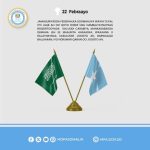MOSCOW — Russia will establish a naval logistic center and repair yard in Sudan under a new agreement signed by Prime Minister Mikhail Mishustin on Nov. 6 but just made public this week.
According to the agreement’s text, the naval logistics center will host up to 300 people. This figure includes both naval service members and civilian personnel. The base can host up to four naval vessels, including nuclear-powered ones.
The Sudanese government will provide Russia with the necessary port infrastructure and a piece of land free of charge.
Russia will be allowed to transfer “any kind of military equipment or munition, equipment or material” through Sudanese ports that are required for the center, the agreement read.
The center will function under Russia’s jurisdiction, and the agreement will last for 25 years, with the option to renew it for another 10-year period.
A few years ago, Russia began looking for ways to establish a permanent base in Djibouti, which already hosts Chinese and American naval bases. But negotiations failed, a Defense News source familiar with the matter previously told Defense News.
It’s unclear how much the center will cost. According to estimates provided by Nezavisimaya Gazeta daily, Russia plans to spend up to 3.2 billion roubles (U.S. $41.5 million) annually to develop its base in Tartus, Syria. The Soviet-era naval logistics center in the Mediterranean was transformed into a permanent base soon after Russia intervened in the Syrian civil war.
The opening of the Sudanese center shows that “Russia is returning to the World Ocean,” defense columnist Dmitry Litovkin wrote in a column for Russian state news agency Tass. Russia’s nuclear-powered cruisers can use the center as a resting place for its crew members, Litovkin noted.
“The sailors of the Northern and Baltic fleets will not have to make exhausting transitions in order to spend several months in the Indian Ocean,” he wrote.
Talks to open a logistics center in Sudan accelerated after Sudanese President Omar Hassan Ahmad al-Bashir visited Russia in 2017. Despite a 2019 coup that removed al-Bashir from power, the talks continued with the de facto head of the country Lt. Gen. Abdel Fattah Abdelrahman al-Burhan.
In 2019, the Kremlin hosted a Russia-Africa summit attended by more than 40 African leaders. “The president is highly interested in African issues,” a senior Russian parliament member who deals with African affairs told Defense News.
Source: Defence News





